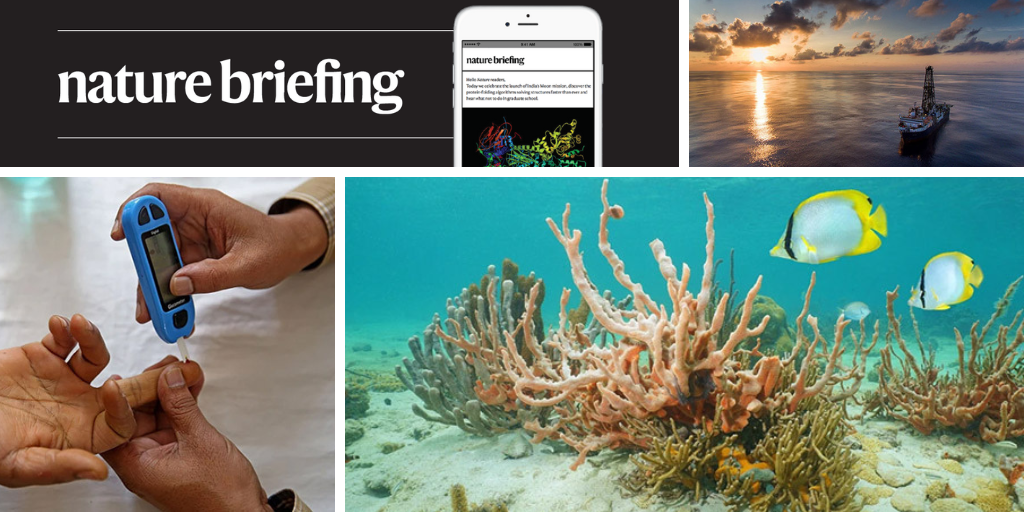
Daily briefing: scientists hail historic high seas treaty
- Select a language for the TTS:
- UK English Female
- UK English Male
- US English Female
- US English Male
- Australian Female
- Australian Male
- Language selected: (auto detect) - EN
Play all audios:

Hello _Nature_ readers, would you like to get this Briefing in your inbox free every day? Sign up here NATIONS FORGE A HISTORIC HIGH SEAS TREATY After two decades of talks and a marathon
38-hour final session of negotiations, United Nations member countries have agreed on a framework to protect marine biodiversity and provide oversight of international waters. The High Seas
Treaty will cover waters outside countries’ national jurisdictions, which extends 370 kilometres from their shores. These waters account for more than 70% of Earth’s surface . The treaty
establishes a mechanism to designate marine protected areas and creates several groups — including a scientific and technical body — to oversee regulations covering issues including marine
genetic resources. “We’re ecstatic,” says Kristina Gjerde, who researches marine environmental law. “This long-awaited treaty contains many of the vital things we need to safeguard our
oceans.” Nature | 5 min read US$25 TRILLION The cost of cancer — including treatment and productivity loss — across the globe over the next 30 years. ( Nature | 4 min read ) Reference: _JAMA
Oncology_ paper ABRUPT END FOR AN OCEAN-SCIENCE ICON What has been the most successful and productive global geosciences collaboration for decades will come to a stark end next year. The US
National Science Foundation (NSF) will retire its ocean-drilling vessel _JOIDES Resolution_ , which has contributed to discoveries such as plate tectonics. “We’re losing a
Hubble-telescope-type capability that we had for five decades,” says marine geologist Anthony Koppers. Researchers are asking the NSF to extend the _JOIDES Resolution_ ’s operations until
2028 to avoid a decade-long gap until a new ship is built. The NSF cited the US$72 million annual running cost as the reason for retiring the 44-year-old vessel. Nature | 5 min read DIABETES
AND OBESITY ARE RISING GLOBALLY The number of type 2 diabetes cases worldwide grew by more than 1.5% annually between 2000 and 2019. And in 2019, obesity and high blood cholesterol levels
killed 5 million and 4.3 million people, respectively. Many people are eating more high-sugar, processed foods and doing less exercise, which might be partially responsible. Income
inequality exacerbates the burden of these metabolic diseases, with people in low- to middle-income countries bearing the brunt . Some researchers warn that it’s more difficult to estimate
death rates than this study makes it seem: people often die of cardiovascular or renal diseases instead of metabolic diseases per se. Nature | 4 min read Reference: _Cell Metabolism_ paper
FEATURES & OPINION THE FIGHT FOR CLEAN INDOOR AIR Bars, gyms and other indoor venues in Belgium will soon be required by law to meet air-quality targets and display real-time
measurements of carbon dioxide concentrations — a proxy for how much clean air is piped in. It’s just one of an unprecedented number of efforts worldwide to make indoor air safer . Huge
challenges lie ahead — retrofitting existing buildings will be an immense, costly undertaking. But countries are set to save billions by reducing the harmful effects of carbon monoxide,
mould spores, cancer-causing fumes, particulates and respiratory pathogens. Nature | 12 min read Read more: We need a proper science of indoor air , write scientists including Christopher
Whitty, the UK government’s chief medical adviser ( Nature | 11 min read ) THE LONG ROAD TO AI REASONING “ChatGPT has no model of what it is talking about. You’re watching a puppet show and
believing the puppets are alive,” says François Chollet, an artificial-intelligence (AI) researcher at Google. Researchers want to change that. By increasing the number of connections
between systems’ artificial neurons and feeding them ever more data, AI could eventually solve tasks that are supposed to require reasoning . Other scientists think this ‘bigger is better’
approach will only suck up more electricity. They hope that mimicking aspects of the brain, such as feedback connections and firing neurons, will help AI to become smaller and more
energy-efficient — and maybe even give it the ability to reason. Nature | 14 min read FLASH FLOODS RISE IN WORLD’S DRIEST REGIONS Flash floods are a growing threat in some of the world’s
driest regions. Last year, for example, around two-thirds of Pakistan was affected by widespread flash flooding, with more than 1,500 people killed and around 33 million made homeless.
Meanwhile, more people are living in drylands, and arid regions are expanding because of climate change. A group of scientists set out six research priorities to address the risks ,
including data collection, early-warning systems and flood protection. Nature | 10 min read QUOTE OF THE DAY “WE DON’T NEED ANOTHER MASSIVELY SHINY CAMPAIGN. WE ACTUALLY NEED TO SUPPORT THE
WOMEN SCIENTISTS THAT WE HAVE.” Physicist Jess Wade is among the scientists who told _Nature_ how we can move the needle on gender equality in science on this International Women’s Day. (
Nature | 5 min read )
